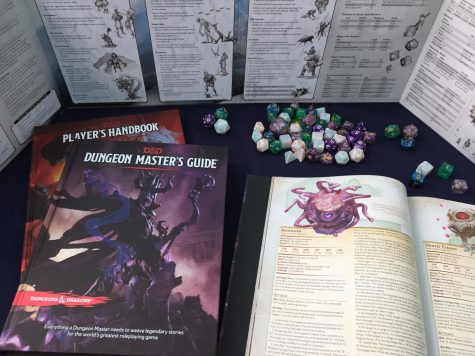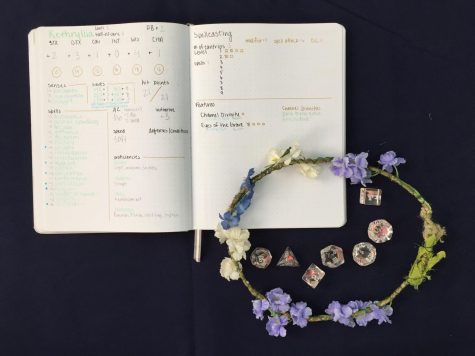Fantasy life lessons
March 26, 2021
At its core, D&D is a combat simulator, but for most, it’s more than that.
“It’s a sandbox world,” senior Robyn Haddad said. “You can fight dragons, you can build a house, you can just do whatever. It’s this own world that you’re in with you and your friends that you can create and have fun and battle and do whatever. It’s so much fun.”
The tone of every campaign can differ. Some are very calm and objective-focused, while other game masters have hard-hitting plots and character development. Senior Ciara Kenny plays in a game that senior Jaaggruth Kondakalla runs, and they have a mixture of fun moments and deep development.
“We get into such ridiculous situations and we love to make fun of each other’s characters,” Kenny said. “It’s all lighthearted, but I enjoy bantering off with my friends about the ridiculousness of what the game is going through.”
There are normally two parts of D&D: combat and role-playing. Both are vital to make the game what it is, but each campaign creates a unique balance. For Kondakalla’s game, he incorporates a lot more role-play, and it is his favorite part of the game.

“I love it when they role-play with each other,” Kondakalla said. “Once they start, I can just step back and let them role-play with each other, maybe add an NPC [non-player character] or two to spice it up. That’s super rewarding for me.”
As a player, senior Jake Zeitner also loves role-playing. Since he got into D&D through an acting-adjacent activity, he naturally led into that side of the game.
“I like acting everything out,” Zeitner said. “I especially liked it with the group that I played with just because everyone did theatre and we were just having a good old time. That was very fun, but also the battling was super cool, even though I wasn’t super good at it.”
In extensive homebrewed worlds, players can explore and learn all about the lore. For German student teacher Beth Savage, exploration is a huge part of the game.
“It hits all of my interests,” Savage said. “It’s reading and lore, all of this past background information. You can take all of that and write and build yourself your own character. That to me, I love it.”
D&D also teaches you about yourself. Through the vessel of a character, players can explore interests, identities, and social strategies. Senior Ciara Kenny found a common pattern with most players.
“I found that it’s always easier to try to be yourself in these games,” Kenny said. “I know it’s kind of escapism, but you never really escape what you really are. Everyone ends up playing what they already think in real life, just with a fantasy twist.”
As Kenny said, D&D is escapism. It gives players a break from reality for four or so hours. Senior Ri Pritchard enjoys being pulled away into a world of his creation.
“D&D allows me to focus on something other than the world around me, so I shift from the world around me into this fantasy world where I can make something whatever I need it to be or have things be a certain way,” Pritchard said. “It creates, not ideal per se, but a world of my own creation in which, if I don’t like something, I can just change it. The interaction of my players and how they shape the world also poses plenty of problem-solving and logical issues that I need to sort out, which is a good way to hold my attention.”
Even though D&D is fantasy, there are so many lessons to pull from the game. Being in a world where there are no real consequences lets you get into tough dilemmas and work your way out, learning along the way.

“Life can be really frustrating, and D&D can be really frustrating, and you have to take your time and know that where you end up, everything will be okay,” Haddad said. “I’ve had situations where you’re in a dungeon, and your whole party is down except for you, and it seems hopeless, but then something happens, or you realize something that you didn’t realize before. You think outside the box and everything works out in the end.”
Some of the lessons from D&D are logistical, like problem solving and perseverance. Other lessons can be social, thanks to the infinite social opportunities with party members and NPCs. On the social side, party dynamics taught Kenny the importance of speaking up confidently.
“If you want things to get done, you can’t take a passive role,” Kenny said. “Even in real life, if you just take what other people are giving you, that’s not your story anymore. Even with people you care about, all my friends in these campaigns, they value my opinion and what I think, so I need to make my voice heard if I want to do things in a way that I find enjoyable.”
Pritchard emphasizes the value of teamwork. Occasionally, players run into toxic stereotypes, one of which being the player who thinks they can “win” D&D. The game is a team effort, and Pritchard tries to enforce collaboration in his campaigns.
“One of the worst things that a player can do is think they are the main character, or they’ve gotten it into their head this notion of winning,” Pritchard said. “Having someone who wants to be the main character of the story deducts from everyone else’s enjoyment of D&D. D&D is collaborative storytelling at its heart.”
Collaborative storytelling. Whether it be the characters working together in-game, or the players working together to schedule and create backstories, the heart of D&D is the collaboration with those at the table.